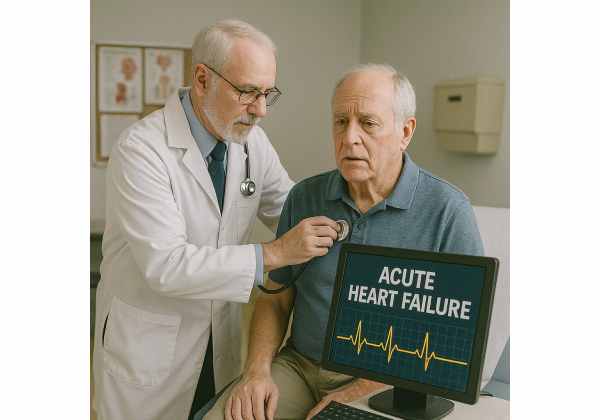
Acute heart failure is a sudden and life-threatening decline in the heart’s ability to pump blood, resulting in the rapid onset of severe symptoms that often require emergency intervention. Unlike chronic heart failure, which develops gradually, acute heart failure can arise unexpectedly—even in people with no previous history of heart problems. Understanding the mechanisms, risk factors, warning signs, diagnostic process, and treatment options for acute heart failure is crucial for timely care, improving outcomes, and empowering patients and caregivers with actionable knowledge.
Table of Contents
- Acute Heart Failure Comprehensive Overview
- Causes, Consequences, and Risk Factors
- Symptoms, Presentation, and Diagnosis
- Modern Management and Treatment Strategies
- Frequently Asked Questions
Acute Heart Failure Comprehensive Overview
Acute heart failure (AHF) refers to the abrupt onset or rapid worsening of symptoms due to the heart’s inability to circulate blood effectively. It is an urgent medical condition that results in congestion—fluid build-up in the lungs and/or other parts of the body—causing shortness of breath, swelling, and decreased oxygen delivery to vital organs.
Key features of acute heart failure:
- May develop as a new (de novo) episode or as an acute decompensation of chronic heart failure.
- Typically presents with severe shortness of breath, cough, and swelling, often requiring hospital admission.
- Is a major cause of emergency department visits and hospitalizations worldwide, especially among older adults.
Why is acute heart failure so dangerous?
- It leads to a sudden and severe reduction in cardiac output.
- Vital organs, including the lungs, kidneys, brain, and liver, may become quickly deprived of oxygen and nutrients.
- Without prompt medical care, complications such as pulmonary edema, cardiogenic shock, and multi-organ failure can develop.
Acute heart failure is a medical emergency that demands rapid assessment and intervention. Early recognition and comprehensive management are essential for improving survival and reducing the risk of long-term complications.
Causes, Consequences, and Risk Factors
Understanding what triggers acute heart failure and who is most at risk allows for better prevention, timely recognition, and effective management. The development of acute heart failure involves a complex interplay between cardiac function, vascular resistance, and body fluid regulation.
What Triggers Acute Heart Failure?
Acute heart failure may occur suddenly in a person with previously healthy cardiac function (de novo AHF), or as a worsening of existing chronic heart failure (acute decompensated heart failure). The most common triggers and underlying causes include:
- Myocardial infarction (heart attack): Sudden loss of heart muscle function due to blocked coronary arteries.
- Hypertensive emergency: Severe, uncontrolled high blood pressure puts acute strain on the heart.
- Arrhythmias: Rapid, irregular, or slow heart rhythms (such as atrial fibrillation, ventricular tachycardia, or bradycardia) that impair cardiac output.
- Acute valvular disease: Sudden worsening of aortic or mitral valve disorders.
- Infections: Severe systemic infections (such as sepsis or pneumonia) can precipitate heart failure.
- Pulmonary embolism: Blood clots in the lungs increase the heart’s workload.
- Noncompliance: Missed medications or dietary indiscretions (excess salt or fluid) in patients with pre-existing heart failure.
- Drug or substance toxicity: Certain chemotherapy agents, illicit drugs, or excessive alcohol can acutely depress heart function.
Risk Factors That Increase Susceptibility
Anyone can develop acute heart failure, but several risk factors make it more likely:
- Existing chronic heart failure
- Coronary artery disease or history of heart attack
- High blood pressure (hypertension)
- Diabetes mellitus
- Valvular heart disease (mitral/aortic stenosis or regurgitation)
- Chronic kidney disease
- Older age
- Obesity and physical inactivity
- Chronic lung diseases (COPD, sleep apnea)
- Excessive alcohol consumption or illicit drug use
- Family history of cardiac disease
Pathophysiology: What Happens During Acute Heart Failure?
At the core of acute heart failure is the inability of the heart to meet the body’s metabolic demands. This can result from:
- Reduced cardiac contractility (weakened heart muscle)
- Impaired ventricular filling (stiff or thickened heart chambers)
- Abrupt changes in blood volume or pressure
The result is a “back-up” of blood in the lungs (causing pulmonary edema) and sometimes the systemic veins (peripheral edema), along with poor perfusion of organs. The body responds by activating stress hormones and retaining salt and water, further worsening congestion.
Practical Prevention Tips
- Take all medications as prescribed, even when feeling well.
- Limit salt intake to reduce fluid retention.
- Weigh yourself daily and report sudden gains (2–3 lbs in 24 hours) to your healthcare team.
- Avoid excess alcohol, recreational drugs, and over-the-counter NSAIDs (which can cause fluid retention).
- Manage chronic conditions such as hypertension, diabetes, and kidney disease rigorously.
- Schedule regular check-ups to catch any early warning signs.
Symptoms, Presentation, and Diagnosis
Acute heart failure can present with a wide range of symptoms, but certain warning signs and diagnostic methods are critical for early detection and appropriate intervention.
Common Symptoms of Acute Heart Failure
- Severe shortness of breath (dyspnea): Often comes on quickly, worsens when lying down (orthopnea), or causes sudden nighttime awakenings (paroxysmal nocturnal dyspnea).
- Rapid weight gain: Resulting from fluid retention.
- Edema: Swelling of feet, ankles, legs, abdomen, or, less commonly, hands and face.
- Persistent cough or wheezing: May be associated with frothy or pink-tinged sputum.
- Fatigue and weakness: Often profound and unrelieved by rest.
- Palpitations: Sensation of rapid or irregular heartbeats.
- Reduced urine output: May indicate kidney involvement.
- Chest discomfort or pressure: Not always present, but can mimic angina or a heart attack.
- Confusion or altered mental status: More common in older adults.
- Cold, clammy skin or cyanosis: Indicating poor circulation and oxygenation.
When to Seek Emergency Medical Attention
Immediate care is crucial if you or someone you know experiences:
- Sudden severe shortness of breath or difficulty breathing at rest
- Chest pain or tightness
- Fainting or severe dizziness
- Frothy sputum or coughing up blood
- Rapid, unexplained swelling or sudden weight gain
- Marked confusion or lethargy
The Diagnostic Process for Acute Heart Failure
Diagnosis involves a combination of clinical assessment and targeted tests:
1. Medical History and Physical Exam
- Inquire about the suddenness of symptoms, medication use, salt/fluid intake, and pre-existing heart disease.
- Examine for elevated jugular venous pressure, abnormal heart or lung sounds, swelling, and changes in mental status.
2. Laboratory Investigations
- Blood tests: B-type natriuretic peptide (BNP) or NT-proBNP, kidney/liver function, electrolytes, cardiac enzymes, complete blood count.
- Urinalysis: May show protein or abnormal sediment in kidney involvement.
- Thyroid function tests: To rule out thyroid-related heart failure.
3. Imaging Studies
- Chest X-ray: Reveals heart size, lung congestion, pleural effusions.
- Electrocardiogram (ECG): Identifies arrhythmias, ischemia, or past infarctions.
- Echocardiography: Ultrasound imaging to assess heart function, structure, and valve disease.
- Point-of-care ultrasound: Rapid bedside assessment of lung congestion or cardiac function.
4. Hemodynamic and Functional Testing
- Pulse oximetry: Monitors oxygen levels.
- Right heart catheterization: In select severe cases, measures cardiac pressures.
Tips for Patients and Caregivers
- Track symptoms and report any rapid changes to your medical team.
- Keep a medication and weight log.
- Prepare a list of all current medications for hospital visits.
- Ask your provider to clarify the difference between acute and chronic heart failure, and what warning signs to watch for.
Modern Management and Treatment Strategies
Managing acute heart failure requires rapid assessment, stabilization, and a multidisciplinary approach tailored to the underlying cause and patient’s unique needs.
Immediate Stabilization
- Hospital admission: Most patients need hospital-level care for close monitoring and therapy.
- Oxygen supplementation: To maintain adequate blood oxygen levels.
- Continuous monitoring: ECG, blood pressure, oxygen saturation, respiratory rate, and urine output.
- IV access: For urgent medication and fluid administration.
First-Line Medical Therapies
1. Intravenous Diuretics
- Loop diuretics (furosemide, bumetanide, torsemide) are the cornerstone for removing excess fluid rapidly.
- Monitor urine output, kidney function, and electrolytes closely.
2. Vasodilators
- Agents such as nitroglycerin or nitroprusside may be given to reduce blood pressure and heart workload, especially if hypertension is present.
3. Inotropic Agents
- Drugs like dobutamine or milrinone can improve heart pumping in patients with very low cardiac output or shock.
4. Treating Underlying Triggers
- Heart attacks require urgent revascularization (angioplasty, stenting).
- Arrhythmias may need rate/rhythm control, cardioversion, or specific anti-arrhythmic drugs.
- Infections are addressed with targeted antibiotics.
5. Respiratory Support
- Noninvasive positive pressure ventilation (CPAP, BiPAP) or mechanical ventilation for severe respiratory distress or pulmonary edema.
Advanced and Supportive Interventions
- Ultrafiltration: Mechanical fluid removal in cases of diuretic resistance.
- Mechanical circulatory support: Temporary devices (intra-aortic balloon pump, ventricular assist device) for patients with persistent cardiogenic shock.
- Renal replacement therapy: Dialysis for severe kidney failure and volume overload.
Discharge Planning and Long-Term Prevention
- Medication Optimization
- Adjust doses of ACE inhibitors, beta-blockers, mineralocorticoid receptor antagonists, ARNI, or SGLT2 inhibitors as tolerated.
- Lifestyle and Education
- Encourage salt/fluid restriction, daily weights, physical activity within tolerance, and strict medication adherence.
- Cardiac Rehabilitation
- Structured programs improve physical fitness, symptom management, and psychological wellbeing.
- Comorbidity Management
- Aggressive control of blood pressure, diabetes, arrhythmias, and kidney disease is critical.
- Patient and Caregiver Support
- Offer counseling, support groups, and educational materials to ease the transition from hospital to home.
Practical Management Tips
- Use pillboxes or medication apps to avoid missed doses.
- Weigh yourself every morning and keep a written record.
- Learn the “zone” system: green = stable, yellow = warning, red = emergency.
- Keep emergency numbers handy and communicate changes promptly to your healthcare team.
- Stay connected with your support system—family, friends, or local organizations.
Frequently Asked Questions
What is acute heart failure and how does it differ from chronic heart failure?
Acute heart failure is a sudden, severe decline in heart function with rapid symptom onset, while chronic heart failure develops gradually and may remain stable for years.
What are the main causes of acute heart failure?
Common causes include heart attacks, arrhythmias, severe high blood pressure, valve disease, infections, missed medications, or sudden changes in fluid balance.
What symptoms should alert me to acute heart failure?
Sudden severe shortness of breath, swelling, rapid weight gain, cough (sometimes with pink sputum), fatigue, confusion, or chest pain are key warning signs.
How is acute heart failure diagnosed?
Diagnosis involves clinical evaluation, blood tests (BNP/NT-proBNP), ECG, chest X-ray, echocardiogram, and sometimes additional imaging or hemodynamic monitoring.
How is acute heart failure treated?
Treatment requires urgent hospitalization, IV diuretics to remove fluid, medications to support heart function, oxygen therapy, and management of underlying causes.
Can acute heart failure be prevented?
Preventive measures include managing chronic conditions, taking medications consistently, limiting salt and fluid intake, daily weight checks, and early response to new symptoms.
What is the outlook after an episode of acute heart failure?
Prognosis depends on age, underlying cause, severity, and ongoing management. Adherence to long-term therapy and lifestyle changes can reduce the risk of recurrence.
Disclaimer:
This article is intended for educational purposes only and does not substitute for professional medical advice. If you or someone you know is experiencing symptoms of acute heart failure, seek emergency medical attention. Always consult your healthcare provider for diagnosis, individualized advice, and management of your health conditions.
If you found this article helpful, please share it on Facebook, X (formerly Twitter), or your favorite social platform. Your support enables us to continue providing high-quality, reliable health information to people around the world. Follow us for more updates and practical guidance on heart health!










